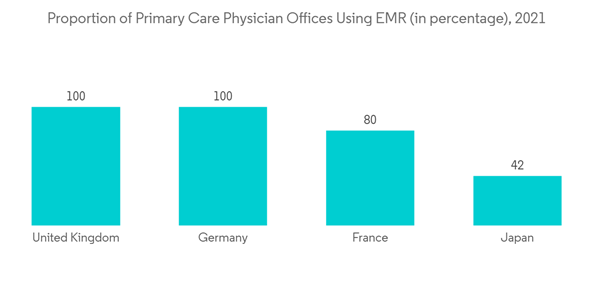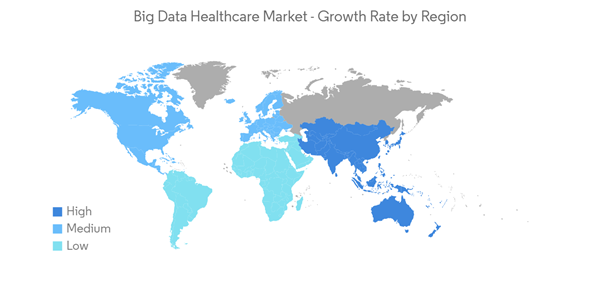The impact of COVID-19 was significant on the studied market as it led to the critical need for cutting-edge technological tools and innovation in the areas of public health, medicine, and wellness, which boosted the utility of big data healthcare solutions. Several companies were engaged in utilizing big data for analyzing patient data and outcomes to better understand the diagnosis and treatment prospects. For instance, in June 2020, the United Kingdom government collaborated with Palantir, a United States-based big data firm, to investigate patient data to respond further to the COVID-19 pandemic. Hence, such initiatives boosted the demand for big data in the healthcare sector during the pandemic and significantly impacted the market.
The need for the deployment of big data in the healthcare sector for disease trend and analysis prediction in recent years has resulted from the healthcare challenges faced during the pandemic with regard to the analysis of enormous data amounts and predict the spread of the coronavirus. The market has been stabilizing in the recent year as the digital transformation of healthcare settings is on the rise, thereby estimated to propel the market growth during the forecast period.
In addition, the increase in demand for analytics solutions for population health management, the rise in the need for business intelligence to optimize health administration and strategy, and the surge in the adoption of big data in the healthcare industry are the factors that drive the growth of the market.
According to a research article published in Nature Public Health Emergency Collection Journal in January 2022, which conducted a survey of 217 medical facilities in Poland reported, the use of big data analytics can aid medical facilities in various ways. The direct research reported that medical facilities in Poland are moving towards data-based healthcare in the current year as they use structured and unstructured data, reach for analytics in the administrative, business, and clinical area, and the adoption of big data in the medical facilities.
Big data analytics in healthcare is the complex process of examining big data to discover information, including hidden patterns, market trends, unknown correlations, and customer preferences. This helps organizations make informed clinical and business decisions. The increase in demand for big data solutions for population health management and the rise in the need for business intelligence to optimize health administration and strategy are expected to drive market growth.
Furthermore, various market players are engaged in strategic initiatives such as product launches, partnerships, and research and development investment, fueling market growth. For instance, in July 2022, Healthcare Triangle Inc, a provider of healthcare and life sciences cloud transformation, managed services, and data analytics platforms, launched its software in Singapore to boost digital healthcare in the city, state, and across the Asia Pacific region. The company announced investing USD 25 million in Singapore over the next five years.
Therefore, owing to the aforementioned factors, the studied market is anticipated to witness growth over the analysis period. However, security concerns related to sensitive patient medical data and the high cost of implementation and deployment are likely to impede the market growth.
Big Data Healthcare Market Trends
Cloud Segment is Expected to Register a High Growth Rate Over the Forecast Period
Cloud deployment is the process of delivering an application using one or more cloud-based hosting models like software as a service (SAAS) or platform as a service (PAAS). Cloud-based solutions are comparatively newer approaches and are mostly used by organizations that lack the internal infrastructure to support them. The installation cost for these systems is lower than the on-premise systems.Various key players are engaged in strategic initiatives such as product launches, approvals, technological advancements, partnerships, and acquisitions, propelling market growth. For instance, in September 2021, Salesforce inc. launched Health Cloud 2.0, a technology designed to empower businesses and governments to deliver better health and safety for their employees, customers, and communities.
Furthermore, in September 2022, Salesforce inc. launched Genie, a hyper-scale real-time data platform that powers the entire Salesforce Customer 360 platform. Every business can use Genie, including the healthcare organizations like hospitals and clinics, to transform data to offer seamless, customized experiences in sales, service, marketing, and commerce that dynamically adjust to changing customer information. Additionally, in December 2021, Oracle acquired Cerner for USD 28.3 billion in transactions. The two companies aim to expand cloud, AI and machine learning applications for Cerner's healthcare clients. This will create opportunities for innovations in the big data healthcare cloud deployment solution during the forecast period. Moreover, the software eradicates the need for in-house maintenance and minimizes the risk of data theft by providing a secure platform for information sharing, which is likely to be the prime factor driving their increasing demand, thereby propelling the segment's growth.
Thus, the above-mentioned factors are expected the segment to grow significantly and contribute to the market growth over the forecast period. The EMRs using cloud deployment, used by various healthcare physicians globally, are further expected to boost the segment's growth.
North America is Expected to Hold a Significant Market Share Over The Forecast Period
North America is expected to dominate the big data healthcare market due to the rise in advancements in the internet of things (IoT) and the increase in demand for analytical models on patient information for better service delivery and government policies the use of promoting telemedicine and EHRs. The region has a vast array of patient information owing to its well-established healthcare infrastructure.As per the data published by HealthIT.gov, during the year 2019-2021, around 86% of non-Federal general acute care hospitals had adopted a certified electronic health record (EHR). High adoption of EHR is associated with the COVID pandemic, which resulted in the maximization of virtual data. Owing to EHR adoption, the market for big data is witnessing high growth in the United States.
Additionally, companies are implementing collaborative strategies in health IT and investing in this sector to meet the increasing demand for big data. For instance, in June 2022, the government of Québec announced a plan to spend USD 951 million over three years to upgrade the hospital system’s technological foundation. The objective is to facilitate professional communication between healthcare providers through improved electronic health records, strengthened security measures, and more efficient networks. Such investments in health IT are expected to play a crucial role in the growth of the big data healthcare market in the region during the forecast period.
Moreover, several companies are collaborating to support big data and improve healthcare. For instance, in June 2022, according to the Government of Canada, the Competition Bureau published recommendations for increasing the availability and adoption of innovative digital healthcare services in Canada. It is expected to boost the demand for big data in healthcare services in Canada and propel market growth during the forecast period.
Thus, owing to the abovementioned factors, the studied market in the North American region is expected to grow over the forecast period.
Big Data Healthcare Market Competitor Analysis
The big data healthcare market is consolidated in nature due to the presence of a few companies operating globally as well as regionally. The competitive landscape includes an analysis of a few international and local companies that hold market shares and are well known. Some key players are Allscripts Healthcare Solutions Inc., DELL EMC, Epic Systems Corporation, General Electric Company (GE Healthcare), SAS INSTITUTE INC., International Business Machines Corporation (IBM), Innovaccer Inc., Oracle (Cerner Corporation), Optum Inc., ExlService Holdings Inc., Health Fidelity Inc., Apixio, and Flatiron Health among others.Additional benefits of purchasing the report:
- The market estimate (ME) sheet in Excel format
- 3 months of analyst support
This product will be delivered within 2 business days.
Table of Contents
Companies Mentioned (Partial List)
A selection of companies mentioned in this report includes, but is not limited to:
- Allscripts Healthcare Solutions Inc.
- DELL EMC
- Epic Systems Corporation
- General Electric Company (GE Healthcare)
- SAS INSTITUTE INC.
- International Business Machines Corporation (IBM)
- Innovaccer Inc.
- Oracle (Cerner Corporation)
- Optum Inc.
- ExlService Holdings Inc.
- Health Fidelity Inc.
- Apixio
- Flatiron Health










